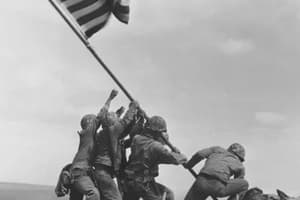Podcast
Questions and Answers
Who was Archduke Franz Ferdinand?
Who was Archduke Franz Ferdinand?
- An Italian diplomat
- A German general
- Heir to the Austria-Hungarian throne (correct)
- A Russian tsar
What did the Austrian Ultimatum to Serbia ask for?
What did the Austrian Ultimatum to Serbia ask for?
Unfair concessions and a 48-hour response time.
What was the Triple Alliance?
What was the Triple Alliance?
A military alliance between Germany, Austria-Hungary, and Italy.
What was the Triple Entente?
What was the Triple Entente?
Who were the Allies during World War I?
Who were the Allies during World War I?
What were the Central Powers?
What were the Central Powers?
What is Moral Diplomacy?
What is Moral Diplomacy?
What did the Jones Act of 1916 provide for the Philippines?
What did the Jones Act of 1916 provide for the Philippines?
What happened in 1914 regarding Puerto Ricans?
What happened in 1914 regarding Puerto Ricans?
What did the 1912 Panama Canal Tolls act do?
What did the 1912 Panama Canal Tolls act do?
What role did Secretary of State William Jennings Bryan have?
What role did Secretary of State William Jennings Bryan have?
What was the Gentleman's Agreement?
What was the Gentleman's Agreement?
What was the Root-Takahira Agreement?
What was the Root-Takahira Agreement?
What was the Great White Fleet?
What was the Great White Fleet?
How did Wilson view Latin America?
How did Wilson view Latin America?
What significant action did Wilson take in Haiti?
What significant action did Wilson take in Haiti?
What was the Hay-Pauncefote Treaty?
What was the Hay-Pauncefote Treaty?
What led to tensions between the U.S. and the Dominican Republic?
What led to tensions between the U.S. and the Dominican Republic?
What event escalated tensions with Mexico in 1914?
What event escalated tensions with Mexico in 1914?
What was the ABC intervention?
What was the ABC intervention?
Who was Pancho Villa?
Who was Pancho Villa?
What was the purpose of the War Industries Board?
What was the purpose of the War Industries Board?
What did the Food Administration aim to achieve?
What did the Food Administration aim to achieve?
What were Liberty Bonds?
What were Liberty Bonds?
What was the Sedition Act of 1918?
What was the Sedition Act of 1918?
What was the Selective Service Act of 1917?
What was the Selective Service Act of 1917?
What was the outcome of the Schenck v. United States case?
What was the outcome of the Schenck v. United States case?
What was the Battle of the Argonne Forest?
What was the Battle of the Argonne Forest?
Which of the following were weapons used in World War I? (Select all that apply)
Which of the following were weapons used in World War I? (Select all that apply)
What were the U.S. casualties in World War I?
What were the U.S. casualties in World War I?
What does demobilization refer to?
What does demobilization refer to?
What was The Red Scare?
What was The Red Scare?
What were the Palmer Raids?
What were the Palmer Raids?
What was the main issue of the 1919 Steel Strike?
What was the main issue of the 1919 Steel Strike?
What was the significance of the Great Seattle Strike?
What was the significance of the Great Seattle Strike?
What triggered the Chicago race riot?
What triggered the Chicago race riot?
What were the Fourteen Points?
What were the Fourteen Points?
What were the main terms of the Treaty of Versailles?
What were the main terms of the Treaty of Versailles?
What did Article X of the Versailles Treaty entail?
What did Article X of the Versailles Treaty entail?
Who were the Big Four?
Who were the Big Four?
Who was Henry Cabot Lodge?
Who was Henry Cabot Lodge?
Match the following groups related to the Treaty of Versailles:
Match the following groups related to the Treaty of Versailles:
What was Wilson's tour about?
What was Wilson's tour about?
What was the outcome of the rejection of the Treaty?
What was the outcome of the rejection of the Treaty?
What were the main issues of the Election of 1920? (Select all that apply)
What were the main issues of the Election of 1920? (Select all that apply)
Who was Warren Harding?
Who was Warren Harding?
What characterized Calvin Coolidge's presidency?
What characterized Calvin Coolidge's presidency?
What was the consequence of public disillusionment over the war?
What was the consequence of public disillusionment over the war?
What was the Association of Nations?
What was the Association of Nations?
Flashcards are hidden until you start studying
Study Notes
Prelude to War
- Archduke Franz Ferdinand's assassination in Sarajevo ignited World War I.
- The Austrian Ultimatum demanded Serbia make unfair concessions within 48 hours, leading to Serbia's partial compliance but refusal to allow Austrian observers.
Alliances
- The Triple Alliance comprised Germany, Austria-Hungary, and Italy; contrasted by the Triple Entente of Great Britain, France, and Russia.
- Allies included Britain, France, Russia, and, later, Italy; while Central Powers were Germany, Austria-Hungary, and the Ottoman Empire.
U.S. Foreign Policy
- Moral Diplomacy, proposed by President Wilson, aimed to promote democracy and peace.
- The Jones Act of 1916 granted the Philippines full territorial status with a bill of rights and a commitment to independence once stable governance was achieved.
Caribbean and Latin America Relations
- Citizenship was granted to Puerto Ricans in 1914, while the U.S. purchased the Virgin Islands from Denmark in 1917.
- Tensions with Japan rose over immigration policies, leading to the Gentleman's Agreement halting Japanese immigration into the U.S.
Military and Economic Engagement
- The U.S. exhibited naval strength through the Great White Fleet, showcasing military power worldwide.
- The Hay-Pauncefote Treaty (1901) solidified U.S. control over the Panama Canal zone under a neutral stance.
Wilson’s Actions in Latin America
- Wilson showed anti-imperialist sentiments but intervened when economic interests were threatened, particularly in Haiti and the Dominican Republic.
- He initially hesitated to involve U.S. troops in Mexican conflicts despite internal unrest, eventually sending troops to pursue Pancho Villa.
Domestic Affairs and Military Mobilization
- The American Expeditionary Force saw about 2 million troops under General Pershing serve in WWI, featuring regular, National Guard, and volunteer divisions.
- The Selective Service Act of 1917 mandated military registration for men aged 21 to 30, fulfilling troop shortages despite initial voluntary enlistment.
War Propaganda and Public Sentiment
- British propaganda effectively swayed American public opinion against Germany, amplifying reports of atrocities.
- The Espionage Act (1917) and Sedition Act (1918) suppressed dissent, making it illegal to criticize the war effort or the government.
Economic Contributions to the War
- The War Industries Board, led by Bernard Baruch, coordinated production efficiency while the Food Administration, under Herbert Hoover, ensured food supply for troops.
- The government sold Liberty Bonds and increased taxes, including excise taxes on luxuries, to fund military operations.
Social Changes and Labor Movements
- The war effort saw women entering the workforce, filling roles left by men, while African American troops, including the Harlem Hellfighters, earned notable recognition.
- The Great Migration transformed urban demographics as millions of African Americans relocated from the South to Northern cities for better opportunities.
Battles and Outcomes
- Significant conflicts included the Second Battle of the Marne, where U.S. forces played a pivotal role in halting German advances, and the Battle of the Argonne Forest, noted as the bloodiest battle with the ultimate forcing of Germany into an armistice.
- U.S. casualties totaled 49,000 in combat, with additional deaths from disease and illness during the war effort.
Post-War Tensions
- The Red Scare fueled fears of communism, leading to the Palmer Raids in 1920 targeting suspected radicals.
- Economic disputes continued with events like the 1919 Steel Strike, which saw massive participation as workers demanded better conditions.### Chicago Race Riot
- Racial tensions escalated when black populations moved into white neighborhoods, impacting job markets.
- The riot was sparked by an incident at a beach, resulting in violence between black and white gangs.
- Death toll included 15 whites and 23 blacks.
Fourteen Points
- Outlined by President Wilson in 1918 to achieve lasting peace post-WWI.
- Key principles included self-determination, freedom of the seas, and free trade.
- Advocated for the reduction of arms, an end to secret agreements, and established a League of Nations.
Treaty of Versailles
- Signed in 1918 by victorious Allied nations including France, Britain, and the US.
- Comprehensive terms: disbandment of the German military, reparations of $33 billion, acknowledgment of guilt for WWI, and a ban on weapon manufacturing in Germany.
Article X
- A component of the Versailles Treaty obligating the U.S. to support League of Nations members against external aggression.
The Big Four
- Refers to the four principal leaders at the Versailles negotiations: Italy, France, England, and the United States.
Henry Cabot Lodge
- Republican senator opposed to the Versailles Treaty, especially critical of the League of Nations’ protective clause.
- Served as Chairman of the Senate Foreign Relations Committee.
Irreconcilables and Reservationists
- Senators were divided over the acceptance of the Treaty of Versailles, reflecting differing views on international engagement.
Wilson's Tour
- President Wilson embarked on a Western tour to garner public support for his foreign policy initiatives.
Rejection of Treaty
- The Senate voted twice on the Treaty of Versailles, leading to its defeat.
- Democrats supported the treaty with reservations, while Wilson's refusal to accept reservations led to its collapse.
Election of 1920
- Warren G. Harding (Republican) faced James Cox (Democrat); central issues included post-WWI challenges and the League of Nations.
- Harding's campaign centered around the theme of "Normalcy".
Warren Harding
- 29th President of the U.S. who advocated for a return to pre-WWI life.
- His presidency was overshadowed by scandals and controversies.
Calvin Coolidge
- Served as President from 1923-1929, known for his conservative, laissez-faire approach.
- Advocated for immigration restrictions and reduced tax burdens.
- Significant legislation included the Bonus Bill (passed despite his veto) and the Revenue Act of 1924.
Old Guard
- Refers to the resurgence of conservative Republicans following public disillusionment with wartime policies.
Association of Nations
- An early concept of an international organization aimed at promoting cooperation among nations to ensure peace and security.
Studying That Suits You
Use AI to generate personalized quizzes and flashcards to suit your learning preferences.





